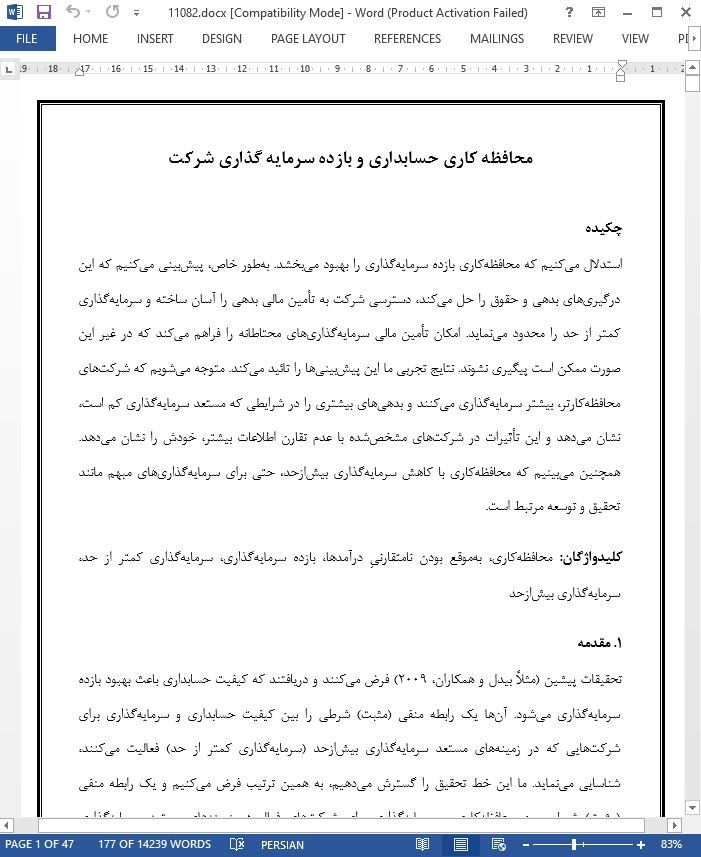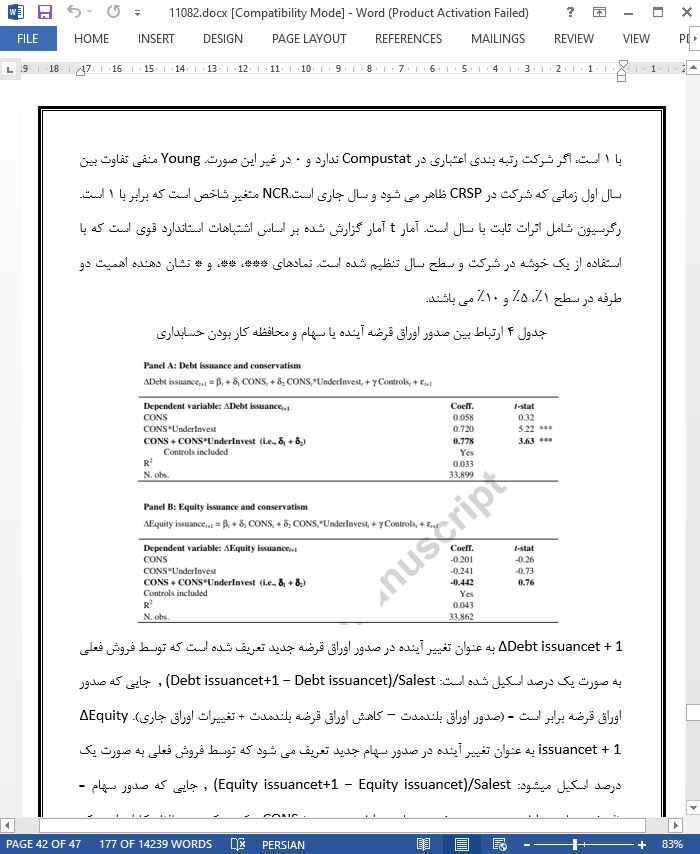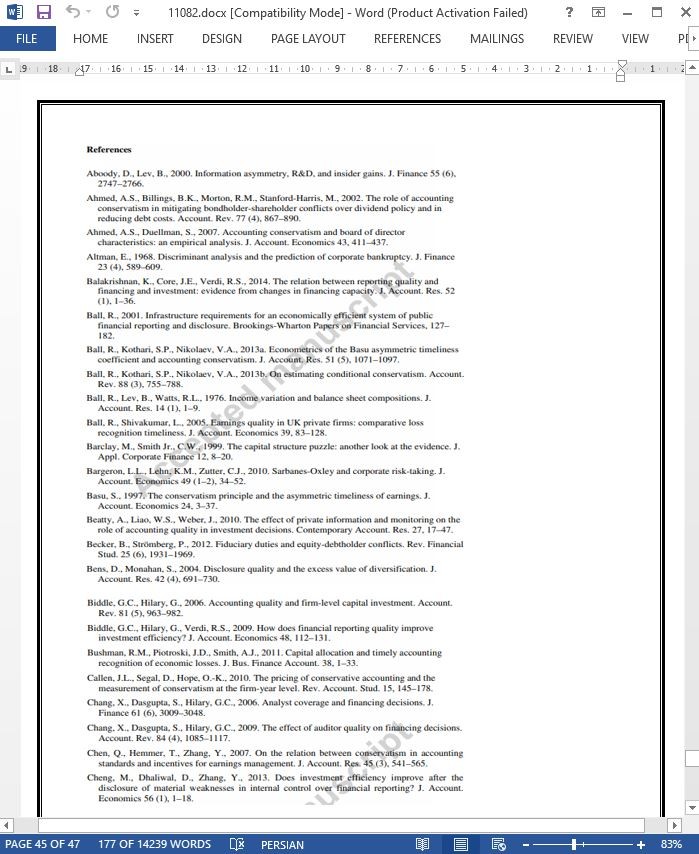
محافظه کاری حسابداری و بازده سرمایه گذاری شرکت
چکیده
استدلال میکنیم که محافظهکاری بازده سرمایهگذاری را بهبود میبخشد. بهطور خاص، پیشبینی میکنیم که این درگیریهای بدهی و حقوق را حل میکند، دسترسی شرکت به تأمین مالی بدهی را آسان ساخته و سرمایهگذاری کمتر از حد را محدود مینماید. امکان تأمین مالی سرمایهگذاریهای محتاطانه را فراهم میکند که در غیر این صورت ممکن است پیگیری نشوند. نتایج تجربی ما این پیشبینیها را تائید میکند. متوجه میشویم که شرکتهای محافظهکارتر، بیشتر سرمایهگذاری میکنند و بدهیهای بیشتری را در شرایطی که مستعد سرمایهگذاری کم است، نشان میدهد و این تأثیرات در شرکتهای مشخصشده با عدم تقارن اطلاعات بیشتر، خودش را نشان میدهد. همچنین میبینیم که محافظهکاری با کاهش سرمایهگذاری بیشازحد، حتی برای سرمایهگذاریهای مبهم مانند تحقیق و توسعه مرتبط است.
1. مقدمه
تحقیقات پیشین (مثلاً بیدل و همکاران، 2009) فرض میکنند و دریافتند که کیفیت حسابداری باعث بهبود بازده سرمایهگذاری میشود. آنها یک رابطه منفی (مثبت) شرطی را بین کیفیت حسابداری و سرمایهگذاری برای شرکتهایی که در زمینههای مستعد سرمایهگذاری بیشازحد (سرمایهگذاری کمتر از حد) فعالیت میکنند، شناسایی مینماید. ما این خط تحقیق را گسترش میدهیم، به همین ترتیب فرض میکنیم و یک رابطه منفی (مثبت) شرطی بین محافظهکاری و سرمایهگذاری برای شرکتهای فعال در زمینههای مستعد سرمایهگذاری بیشازحد (سرمایهگذاری کمتر از حد) را مییابیم. همچنین میبینیم که شرکتهای محافظهکارتری که در زمینههای مستعد سرمایهگذاری کمتر از حد کار میکنند، بدهی بیشتری داشته و در پروژههای محتاطانه سرمایهگذاری میکنند و اینکه آن تأثیرات سرمایهگذاری و تأمین مالی محافظهکاری در حضور عدم تقارن اطلاعات بیشتر، خودش را نشان میدهد.
7. نتیجه گیری
ارتباط بین محافظه کاری و بهره وری سرمایه گذاری شرکت ها را بررسی می کنیم. ما متوجه می شویم که در زمینه هایی که شرکت ها مستعد کمبود سرمایه هستند، شرکت های محافظه کار تر، بیشتر سرمایه گذاری می کنند و اوراق قرضه بیشتری را نسبت به موارد کمتر محافظه کار صادر می کنند. این اثرات محافظه کاری بر سرمایه گذاری و تامین مالی در حضور عدم تقارن اطلاعات بیشتر است. شواهد تجربی ما با کارهای تحلیلی پیشین مطابقت دارد که نشان می دهد محافظه کاری سبب دسترسی به اوراق قرضه می شود (Göx and Wagenhofer، 2009). این کار با تحقیق قبلی جور است که نشان می دهد که دارندگان اوراق قرضه، حسابداری محافظه کارانه را درخواست می کنند، زیرا نظارت آنها را تسهیل می کند. همچنین می بینیم که در زمینه های مستعد سرمایه گذاری بیش از حد، محافظه کاری، سرمایه گذاری را نه تنها برای اکتساب کاهش میدهد، همانطور که توسط فرانسیس و مارتین (2010) تایید شده است، بلکه همچنین برای انواع سرمایه گذاری های سخت تر برای نظارت را نیز کاهش میبخشد.
Abstract
We argue that conservatism improves investment efficiency. In particular, we predict that it resolves debt-equity conflicts, facilitating a firm׳s access to debt financing and limiting underinvestment. This permits the financing of prudent investments that otherwise might not be pursued. Our empirical results confirm these predictions. We find that more conservative firms invest more and issue more debt in settings prone to underinvestment and that these effects are more pronounced in firms characterized by greater information asymmetries. We also find that conservatism is associated with reduced overinvestment, even for opaque investments such as research and development.
1. Introduction
Prior research (e.g. Biddle et al., 2009) hypothesizes and finds that accounting quality improves investment efficiency. They identify a conditional negative (positive) association between accounting quality and investment for firms operating in settings prone to overinvestment (underinvestment). We extend this line of research, similarly hypothesizing and finding a conditional negative (positive) association between conservatism and investment for firms operating in settings prone to overinvestment (underinvestment). We also find that more conservative firms in settings prone to underinvestment issue more debt and invest in more prudent projects, and that the investment and financing effects of conservatism are more pronounced in the presence of greater information asymmetries.
7. Conclusions
We study the association between conservatism and the investment efficiency of firms. We find that, in settings where firms are prone to underinvest, more conservative firms invest more and raise more debt than less conservative ones. These effects of conservatism on investment and financing are more pronounced in the presence of information asymmetries. Our empirical evidence is consistent with prior analytical work showing that conservatism facilitates access to debt (Göx and Wagenhofer, 2009). This comports with prior research that indicates that debtholders demand conservative accounting because it facilitates their monitoring. We also find that, in settings prone to overinvestment, conservatism reduces investment not only for acquisitions, as documented by Francis and Martin (2010), but also for other harder-to-monitor types of investments.
چکیده
1. مقدمه
2. محافظه کاری، سرمایه گذاری و تامین مالی: توسعه فرضیه ها
3. طراحی تحقیق
3.1 پروکسی اصلی برای گزارش محافظه کاری
3.2 ارتباط بین محافظه کاری و بهره وری سرمایه گذاری
4. نتایج تجربی اصلی
4.1 نمونه و داده
4.2 ارتباط بین محافظه کاری و بهره وری سرمایه گذاری
4.3. سرمایه گذاری در آینده و محافظه کاری: اثرات عدم تقارن اطلاعات
4.4 ارتباط بین محافظه کاری و دسترسی به تامین مالی بدهی
5. تحلیل عواقب سودآوری
6. آزمون های نیرومندی
6.1 معیار جایگزین سرمایه گذاری
6.2 پروکسی های محافظه کاری جایگزین
7. نتیجه گیری
Abstract
1. Introduction
2. Conservatism, investment and financing: development of hypotheses
3. Research design
3.1. Main proxy for reporting conservatism
3.2. Association between conservatism and investment efficiency
4. Main empirical results
4.1. Sample and data
4.2. Association between conservatism and investment efficiency
4.3. Future investment and conservatism: effects of information asymmetry
4.4. Association between conservatism and access to debt financing
5. Analysis of profitability consequences
6. Robustness tests
6.1. Alternative measure of investment
6.2. Alternative conservatism proxies
7. Conclusions
- اصل مقاله انگلیسی با فرمت ورد (word) با قابلیت ویرایش
- ترجمه فارسی مقاله با فرمت ورد (word) با قابلیت ویرایش، بدون آرم سایت ای ترجمه
- ترجمه فارسی مقاله با فرمت pdf، بدون آرم سایت ای ترجمه



